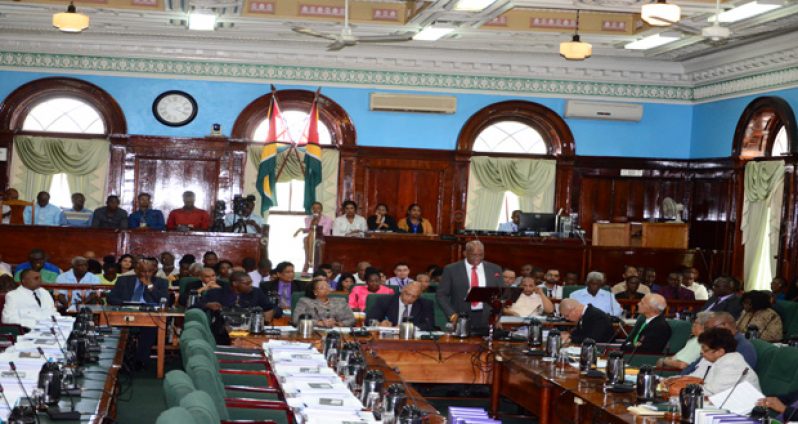WITH Guyana ranking 123 of 189 countries in the World Bank’s Doing Business Index, 2 points lower than its 2014 ranking, Finance Minister Winston Jordan said the Government will smash the suffocating red tape that stifles businesses and stunts national growth.Delivering his maiden Budget Speech, Mr Jordan told the House that this will be facilitated by the computerisation of the licensing section of the Ministry of Business, which would allow for more timely and efficient processing of import and export licenses.
“A help desk for businesses will be established; it will act as a single point of contact for information and tailored advice among businesses, traders and the Government – for example, implementing measures to reduce the time taken to get electricity and construction permits; encouraging greater and wider compliance with international standards; and making the entire institutional framework transparent, so as to reduce corruption and enhance overall efficiency,” Mr Jordan said.
He said the Government is committed to making it easier for people to set up new enterprises, and this will be done via the implementation of strategies to reduce the time and steps necessary to start a new business.
The Ministry of Business intends to establish a Small Business Development Centre, which will facilitate the needs of small and medium-sized enterprises (SMEs) in research and document preparation, and reduce the requirements necessary to access the Micro and Small Enterprise Development grant.
Initiatives are also planned to make Go-Invest the single stop when registering a new business, which would greatly reduce the burden placed on the investor.
“This will also be coupled with a reduction in the number of forms needed to be completed in the entire registration phase and more towards a ‘one-click’ registration system. Moreover, in a bid to foster improvements in the trading environment in Guyana, the Ministry will be strongly involved in laying the foundation for a Single Window Automated Processing System (SWAPS),” Mr Jordan said.
He said SMEs are pivotal to enhancing economic livelihoods and stimulating competitiveness, and in this regard, the Government plans to provide added stimuli to small businesses to spur their growth and contribution to the development of the country.
This will be done through activities such as administering a Credit Guarantee Scheme through Partner Financial Institutions, administering an Interest Payment Facility (IPF) for micro loans through Partner Micro Financial Institutions, and administering the Low Carbon Grant Scheme for working capital and asset acquisition for micro and small businesses, just to name a few.
Minister Jordan also said that the Ministry of Business, through its Small Business Bureau, plans to advance the SME 20 % procurement initiative as early as 2016, so that SMEs can have a fair chance of being awarded Government contracts.
“Economic growth and social development ultimately depend on efficiency and dynamism of the private sector within a healthy and competitive environment. For this reason, the Government plans on ensuring a level playing field between small and large businesses and between foreign and domestic enterprises. The Government plans to aggressively enforce compliance with the Consumer Affairs Act and its provisions through the operations of the Competition and Consumer Affairs Commission (CCAC). The Commission will target offences such as price fixing, conspiracy, bid rigging, misleading advertisements, anti-competitiveness, abuse of dominant position, resale price maintenance,” he said.
Private Sector
The Minister also told the House that the Government has recognised the importance of the private sector in fuelling economic development. It creates job and entrepreneurial opportunities; establishes inter-firm linkages; facilitates the transfer of technology; builds human capital as well as physical infrastructure; generates public revenue via taxes; and offers a variety of products and services to consumers and other firms.
Notably, each of these impacts has multiplier effects on both social and economic development, and being aware of its significance, the Government plans on making private-public partnerships the avenue through which issues are identified and policies implemented to remedy them.
This will be done via regular engagement of private sector bodies at various levels of decision making.
“Our Government intends to make Guyana the ideal place for doing business, and our comprehensive and sustained economic proposals will lay the foundation for a stronger economy, sustainable jobs and higher incomes for all. It will pave the way for Guyanese businesses to take advantage of the many emerging opportunities and withstand global shocks which may come our way,” Jordan said.
By Tajeram Mohabir



.jpg)








